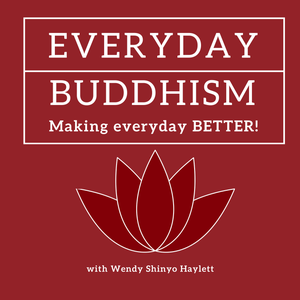
Everyday Buddhism: Making Everyday Better
Wendy Shinyo Haylett
- 1 hour 23 minutesEveryday Buddhism 112 - Buddhist Response to Election Angst with Scott Snibbe
In this episode I invited Scott Snibbe to join me for a conversation about Buddhist responses to the anxiety, apprehension, insecurity, fear, dread, anger … and on and on … that some people are feeling now.
Scott Snibbe is a twenty-five-year student of Tibetan Buddhism whose teachers include Lama Zopa Rinpoche and His Holiness the Dalai Lama.
He is the author and host of the How to Train a Happy Mind book and podcast. Scott leads meditation classes and retreats worldwide in a style that will become evident in our upcoming conversation. His light-hearted approach is infused with humor, science, and the realities of the modern world.
Scott is a new media artist whose installations have been incorporated into museums, public spaces, and performances. He has collaborated with musicians and filmmakers including Björk, Philip Glass, Beck, and James Cameron, and his work can be found in the collections of New York MoMA, the Whitney Museum of American Art, and other institutions.
Listen in as we talk about how the Dharma can help us see things as clear and non-reactive as possible. In this conversation, we talk about:
- The key to non-violent communications is listening.
- You don't have to agree with someone to understand them.
- The antidote to anger is curiosity.
- No matter what other people believe, each is driven by a desire for happiness.
- Radical acceptance and how acceptance IS transcendence.
- And so much more…
26 November 2024, 4:31 pm - 1 hour 19 minutesEveryday Buddhism 111 - Buddhist Psychology with Natalie Baker
In this episode I talk with Natalie Baker. Natalie is a psychotherapist and Buddhist teacher, with more than 30 years of personal practice and 2+ decades of teaching experience. She is the founder of Neurofeedback Training Co. and a practicing psychotherapist in New York City, Natalie blends the wisdom of Buddhist psychology with modern therapeutic techniques, empowering individuals to navigate life's challenges with mindfulness, compassion, and resilience.
Natalie teaches from the strength of her own Buddhist practice, sharing the transformative power of mindfulness and meditation with others.
In addition to her psychotherapy practice, Natalie has been instrumental in bringing neurofeedback—a cutting-edge brain training technology—into the mainstream. Neurofeedback is often described as "meditation for the limbic brain", helping individuals achieve greater mental clarity and emotional stability by training the brain to self-regulate.
Stay tuned as we talk about some of my favorite subjects, including:
- Mindfulness and meditation
- Buddha Nature as basic goodness or fundamental sanity
- Finding the brilliance in the energy of fear
- Fearlessness and gentleness as key tools for self-healing and self-discovery
- Connecting with our warm heart
And more!
Learn more about Natalie: https://buddhistpsychotherapyny.com Instagram: https://www.instagram.com/neurofeedbacktrainingco/ YouTube: https://www.youtube.com/channel/UCiQ-_zRCvrL3GdEq7k6rIGQ Natalie Baker LinkedIn: https://www.linkedin.com/in/natalie-baker-0a025212/ Become a patron to support this podcast and get special member benefits, including a membership community and virtual sangha:https://www.patreon.com/EverydayBuddhism Join the Everyday Sangha: Join the Everyday Sangha Join the Membership Community: https://donorbox.org/membershipcommunity Check out my Substack and podcast, Words From My Teachers: https://wendyshinyohaylett.substack.com/ If this podcast has helped you understand Buddhism or help in your everyday life, consider making a one-time donation here: https://donorbox.org/podcast-donations Support the podcast through the affiliate link to buy the book, Everyday Buddhism: Real-Life Buddhist Teachings & Practices for Real Change: Buy the book, Everyday Buddhism Support the podcast and show your support through the purchase of Everyday Buddhism merch: https://www.zazzle.com/store/everyday_buddhism NOTE: Free shipping on ALL (unlimited) items (Everyday Buddhism merch or gifts from other stores) if you join Zazzle Plus for $19.95/year:24 September 2024, 5:57 pm - 1 hour 5 minutesEveryday Buddhism 110 - Poetry and Writing as Spiritual Practice with Nadia Colburn
In this episode I talk with Nadia Colburn. Nadia is the author of the poetry books, I Say the Sky and The High Shelf, and her poetry and prose have appeared in more than eighty publications, including The New Yorker, American Poetry Review, The Kenyon Review, Spirituality & Health, Lion's Roar, and The Yale Review.
She holds a Ph.D. in English from Columbia University, is a yoga teacher and serious student of Thich Nhat Hanh, and is the founder of Align Your Story Writing School, which brings traditional literary and creative writing studies together with mindfulness, embodied practices, and social and environmental engagement. The school has a community of over 30,000 mindful writers. Nadia lives in Cambridge, Massachusetts, with her husband and two children.
Stay tuned as we listen to Nadia read some poems from her book and talk about, among many other things:
- The relationship between Buddhist / meditation practice and writing.
- Poetry and literature as a companion or an offering as a mirror to yourself.
- Literature as a place where people can speak truths that are sometimes uncomfortable but not talked about all the time.
- Writing as therapy and healing.
- And much more!
Sit back and enjoy the flow of conversation and poetry with the delightful Nadia Colburn.
Buy the book (Amazon affiliate link): I Say the Sky Learn more about Nadia: https://nadiacolburn.com/ Free writing and meditation resources: https://nadiacolburn.com/free-resources/ Free 5-day meditation and writing challenge: https://nadiacolburn.com/free-mindful-writing-challenge/ Nadia Colburn Instagram: https://www.instagram.com/nadia.colburn/ Nadia Colburn Facebook: https://www.facebook.com/alignyourstory/ Become a patron to support this podcast and get special member benefits, including a membership community and virtual sangha:https://www.patreon.com/EverydayBuddhism Join the Everyday Sangha: Join the Everyday Sangha Join the Membership Community: https://donorbox.org/membershipcommunity Register for the next Introduction to Buddhism course (virtual-Zoom), beginning Thursday, August 29, 2024! Register NOW to get the first readings and reflections in your email, before the class! https://www.everyday-buddhism.com/p/introduction-to-buddhism-course-and-registration-1/ If this podcast has helped you understand Buddhism or help in your everyday life, consider making a one-time donation here: https://donorbox.org/podcast-donations Support the podcast through the affiliate link to buy the book, Everyday Buddhism: Real-Life Buddhist Teachings & Practices for Real Change: Buy the book, Everyday Buddhism Support the podcast and show your support through the purchase of Everyday Buddhism merch: https://www.zazzle.com/store/everyday_buddhism NOTE: Free shipping on ALL (unlimited) items (Everyday Buddhism merch or gifts from other stores) if you join Zazzle Plus for $19.95/year:20 August 2024, 6:13 pm - 1 hour 28 minutesEveryday Buddhism 109 - How to Train a Happy Mind with Scott Snibbe
In this episode I talk with Scott Snibbe, the creator and host of the popular podcast, A Skeptic's Path to Enlightenment and the author of the new book, How To Train a Happy Mind, with foreword by His Holiness the Dalai Lama.
Scott is a twenty-five-year student of Tibetan Buddhism whose teachers include Lama Zopa Rinpoche and His Holiness the Dalai Lama. He leads meditation classes and retreats worldwide in a style that will become evident in our upcoming conversation. His light-hearted approach is infused with humor, science, and the realities of the modern world.
Scott is a new media artist whose installations have been incorporated into museums, public spaces, and performances. He has collaborated with musicians and filmmakers including Björk, Philip Glass, Beck, and James Cameron, and his work can be found in the collections of New York MoMA, the Whitney Museum of American Art, and other institutions.
Listen as we talk about Scott's new book and how you really can build positive habits founded on ancient Buddhist practices, leading to a happy mind. And if you're a skeptic, no problem, Scott has you covered. Check out our conversation and I'm convinced you'll want more!
In this conversation, we talk about:
- The Lam-Rim, a 1000-year old Tibetan teaching tradition that is as effective today in training a happy mind.
- Analytical meditation—a practice both Scott and I credit for significant transformation in our lives … A practice of pointing the mind at the mind, training our thinking to be a friend and not a distraction.
- Buddha Nature—What is it?
- And so much more…
10 July 2024, 2:53 pm - 1 hour 18 minutesEveryday Buddhism 108 - Heart Teachings from Bhikkhuni Dhammananda with Cindy Rasicot
In this episode I talk with Cindy Rasicot, about her new book, This Fresh Existence: Heart Teachings from Bhikkuni Dhammananda. Cindy is an award-winning author of the memoir Finding Venerable Mother: A Daughter's Spiritual Quest to Thailand.
Cindy also hosted a weekly YouTube series that welcomed people from all walks of life to explore their spiritual practice in conversation with Venerable Bhikkhuni Dhammananda. Guests have included Jack Kornfield, Sylvia Boorstein, Joan Halifax, and many others. The conversations showcase Venerable Dhammananda's wise and warm teaching style.
In this conversation we talk about Venerable Dhammananda and her amazing and inspirational life journey from academic to activist to spiritual leader. She is an advocate of serious reform for monastic and lay Buddhists, including—of course—the reestablishment of the Bhikkhuni order. She also speaks out, urging all genders and classes to be advocates of equality for women.
We also talk about some of the direct teachings found in 10 chapters of Cindy's book, This Fresh Existence: Heart Teachings from Bhikkuni Dhammananda. Teachings that include meditation, forgiveness, loneliness, grasping, uncertainty, and ageing—among others.
Buy the book (Amazon affiliate link): This Fresh Existence: Heart Teachings from Bhikkhuni Dhammananda Learn more about Cindy Rasicot: https://cindyrasicot.com/ Learn more about Venerable Dhammananada and her monastery, Sondhammakalayni Temple: https://cindyrasicot.com/about-venerable-dhammanda/ https://www.songdhammakalyani.com/ Casual Buddhism YouTube: www.youtube.com/@casualbuddhism Cindy Rasicot Instagram: https://www.instagram.com/cindy.rasicot Cindy Rasicot Facebook: https://www.facebook.com/cindy.rasicot.author Become a patron to support this podcast and get special member benefits, including a membership community and virtual sangha:https://www.patreon.com/EverydayBuddhism Join the Everyday Sangha: Join the Everyday Sangha Join the Membership Community: https://donorbox.org/membershipcommunity If this podcast has helped you understand Buddhism or help in your everyday life, consider making a one-time donation here: https://donorbox.org/podcast-donations Support the podcast through the affiliate link to buy the book, Everyday Buddhism: Real-Life Buddhist Teachings & Practices for Real Change: Buy the book, Everyday Buddhism Support the podcast and show your support through the purchase of Everyday Buddhism merch: https://www.zazzle.com/store/everyday_buddhism NOTE: Free shipping on ALL (unlimited) items (Everyday Buddhism merch or gifts from other stores) if you join Zazzle Plus for $19.95/year:18 June 2024, 12:19 pm - 27 minutes 34 secondsBONUS Episode - Re-Release of Why Sangha - Bringing Buddhism to Life
Celebrate the Everyday Sangha by listening to this special bonus re-release of episode 26, Why Sangha? Bringing Buddhism to Life. This re-released episode is the first episode I talked about the Three Treasures, The Three Jewels, or the Triple Gem of Buddhism.
Back in April of 2019, I released this episode to announce the launch of our Everyday Sangha. I'm re-releasing it today, in a bow of gratitude to the sangha, which has grown into a wonderful community.
I am celebrating the sangha and the 16 sangha members who are going for refuge and receiving Dharma names in the non-sectarian, Mahayana lineage of Bright Dawn Buddhism/Kubose Dharma Legacy this Saturday, on June 1st in a special TiSarana Ceremony. These 16 will officially take refuge in the Three Jewels: the Buddha, Dharma, and Sangha.
So, congratulations to the those 16 taking refuge and a huge thank you to the Everyday Sangha for being such a special group!
I think many connect with the *jewel* or treasure aspect of the Buddha and Dharma, but Sangha? The Buddha taught the Dharma as an experiential path. His advice is to try it for ourselves, rather than taking his or anyone else's word for it.
It is Sangha that moves Buddhism beyond a study or philosophy to something lived and alive. But you have to practice or it doesn't work. Sangha is where you perfect your practice with others doing the same thing.
We come just as we are. Working on practices, not being people who are already perfect. The Sangha accepts us and supports us so that we can become more honest with ourselves and others. We learn to accept ourselves AND others. We accept our humanity, together.
31 May 2024, 2:41 pm - 1 hour 1 minuteEveryday Buddhism 107 - Your Heart Was Made for This with Oren Jay Sofer
In this episode I talk with Oren Jay Sofer about his new book, Your Heart Was Made for This: Contemplative Practices for Meeting a World in Crisis with Courage, Integrity & Love.
Oren teaches meditation and communication internationally. He holds a degree in comparative religion from Columbia University and is a Certified Trainer of Nonviolent Communication and a Somatic Experiencing Practitioner for the healing of trauma.
Oren has practiced meditation in the early Buddhist tradition since 1997, beginning his studies in Bodh Gaya, India, and later spending 2-1/2 years living as an renunciate at branch monasteries in the Ajahn Chah Thai Forest lineage. He is a long-time student of Joseph Goldstein, Michele McDonald, and Ajahn Sucitto, and is a member of the Spirit Rock Teacher’s Council.
Oren is also the author of the best-seller Say What You Mean: A Mindful Approach to Nonviolent Communication and two books on teaching mindfulness to adolescents: The Mindful Schools Curriculum for Adolescents and Teaching Mindfulness to Empower Teens.
His teaching has reached people around the world through online communication courses and guided meditations, combining classical Buddhist training with the accessible language of secular mindfulness
In our conversation we talked about, among other things:
- How our hearts REALLY are made for these times … Our hearts were made to awaken and if we can practice—in small steps—turning toward suffering, we enter a portal to transformation.
- How the world shapes our hearts in ways not best for us and how we can practice shaping our own hearts.
- How getting in touch with our true values will guide us through these challenging times.
- How we need to consciously "change the channel" of our thoughts to be more aligned with our true values.
11 April 2024, 6:29 pm - 1 hour 18 minutesEveryday Buddhism 106 - Appalachian Zen with Steve Kanji Ruhl
Join me for a delightful conversation with Steve Kanji Ruhl about his book, Appalachian Zen: Journeys in Search of True Home, from the American Heartland to the Buddha Dharma, the 2023 Gold Prize winner for Memoir in the Nautilus Book Awards.
Steve Kanji is a Zen Buddhist minister ordained in the Zen Peacemaker Order, now teaching independently and instructing Zen students through his Touch the Earth cyber-sangha. Reverend Kanji received his Master of Divinity degree from Harvard University and is a Buddhist chaplain at Deerfield Academy, a Buddhist Adviser at Yale University, and faculty member of the Shogaku Zen Institute.
Kanji has been a guest speaker or workshop facilitator at Harvard’s Center for World Religions, Yale Divinity School, the International Conference on Socially Engaged Buddhism, the Omega Institute, and elsewhere.
In addition to Appalachian Zen, he is the author of Enlightened Contemporaries: Francis, Dogen & Rumi—Three Great Mystics of the Thirteenth Century and Why They Matter Today and has recently finished writing a new book about his personal experience of spirituality and wellness called The Whole Earth is Medicine: Science, Zen, and Healing Body and Mind in a Journey through Cancer. He has also published two volumes of poems, The Constant Yes of Things and Paintings of Rice Cakes Satisfy Hunger.
In his book, Appalachian Zen, Kanji takes us on a 30-year journey through his search to find his "true home" in lilting and lyrical prose and poems that move the story from Appalachia through academia—constantly asking: What is home? What is this? What is life? Death? What is real? … The questions Buddhism never answer but continue to ask.
In our conversation we talked about, among other things:
-Childhood memories
-The search for self and the search for losing the self
-Being a foolish being and Shin Buddhism
-The contrast between Western and Eastern philosophical and spiritual worldviews
-Mystical Christianity and the similarity to the direct experience of the sacred in Buddhism
-Buddhist lay ministers as compared to Buddhist monastics, priest, and the "guru model"
-Kanji's teaching of "Be Clear, Be Kind, Be Present"
Buy the book (Amazon affiliate link): Appalachian Zen Buy the book from the publisher: Appalachian Zen Learn more about Steve Kanji Ruhl, his teaching, spiritual guidance, and special events: http://www.stevekanjiruhl.com *Special Everyday Buddhism Substack / Words From My Teachers podcast subscription promo code: Redeem by 3/31/2024 for 20% subscription for 1 year! Become a patron to support this podcast and get special member benefits, including a membership community and virtual sangha:https://www.patreon.com/EverydayBuddhism Join the Everyday Sangha: Join the Everyday Sangha Join the Membership Community: https://donorbox.org/membershipcommunity If this podcast has helped you understand Buddhism or help in your everyday life, consider making a one-time donation here: https://donorbox.org/podcast-donations Support the podcast through the affiliate link to buy the book, Everyday Buddhism: Real-Life Buddhist Teachings & Practices for Real Change: Buy the book, Everyday Buddhism13 March 2024, 12:17 pm - 1 hour 23 minutesEveryday Buddhism 105 - Illumination with Rebecca Li
In this episode, I welcome back Rebecca Li to talk about her new book, Illumination: A Guide to the Buddhist Method of No Method. Rebecca and I had a conversation in May of 2021, about her previous book, Allow Joy into Our Hearts: Chan Practice in Uncertain Times.
Rebecca is a meditation and Dharma teacher in the lineage of Chan Master Sheng Yen and founder and guiding teacher of Chan Dharma Community, a Chan Buddhist practice and study community made up of individuals committed to cultivating wisdom and compassion for the benefit of all beings.
Rebecca has two decades of Dharma and meditation teaching experience, leading retreats or teaching at Buddhist centers in North America, Europe, and Asia. She has been featured in several Buddhist publications, including Tricycle, Lion's Roar, and Buddhadharma.
She is also one of the founding board members of The GenX Buddhist Teachers Sangha where she continues to serve as a board member. Rebecca is a sociology professor and lives with her husband in New Jersey.
In Allow Joy into Our Hearts, Rebecca wrote about Chan Practice and she continues to teach the path of Chan Buddhism in the book we will discuss today, Illumination. In Illumination, she dives deeper into the Chan meditation of Silent Illumination and deeper still into what causes our suffering and how Silent Illumination can help us identify and help decrease the causes of our suffering.
In her book, Rebecca takes us on a fascinating, deep-dive into the method of no method in silent illumination and guides us in the mechanics of this type of practice. In our conversation we talked about, among other things:
- How, in our meditation, we turn thoughts into enemies, rather than allowing thoughts and feelings to be fully experienced and felt …
- About how tend to try to "achieve" as meditators, as if a sport …
- And about the modes of operation: craving, aversion, trance, problem-solving, intellectualizing, quietism, and forgetting-emptiness …
14 February 2024, 3:20 pm - 7 minutes 29 secondsEveryday Buddhism 104 - BONUS - Purposeless Purpose
This week, over at my new premium Substack podcast, Words From My Teachers, I released Episode 6, continuing readings from the book, The Center Within by Rev. Gyomay Kubose. In the episode I read the following essays: Middle Way, Water, Purposeless Purpose, No Mind, and How the Buddha Taught.
As a special bonus episode for the Everyday Buddhism podcast, I am sharing the reading of the essay Purposeless Purpose. It's a wonderful essay to reflect on, as they all are in The Center Within, but I'm releasing it here on the Everyday Buddhism podcast as a companion piece to Episode 103.
Become a patron to support this podcast and get special member benefits, including a membership community and virtual sangha:https://www.patreon.com/EverydayBuddhism If this podcast has helped you understand Buddhism or help in your everyday life, consider making a one-time donation here: https://donorbox.org/podcast-donations Subscribe to my premium Substack feed and podcast, Words From My Teachers: Subscribe to "Words From My Teachers" Support the podcast through the affiliate link to buy the book, Everyday Buddhism: Real-Life Buddhist Teachings & Practices for Real Change: Buy the book, Everyday Buddhism26 January 2024, 7:08 pm - 32 minutes 33 secondsEveryday Buddhism 103 - Purposeless Purpose: Why Nonsense Makes the Most Sense Redux
As a special bonus episode for the Everyday Buddhism podcast, I am sharing the reading of the essay Purposeless Purpose. It's a wonderful essay to reflect on, as they all are in The Center Within, but I'm releasing it here on the Everyday Buddhism podcast as a companion piece, which you will find in the next episode, 104.
But as a special introduction to the bonus episode, I am adding new content in this re-release of an episode I did in June of 2022, called Why Nonsense Makes the Most Sense, which was built on the essay, Purposeless Purpose.
The new addition is some insight about meditation that is related to the purposeless-purpose message.
Become a patron to support this podcast and get special member benefits, including a membership community and virtual sangha:https://www.patreon.com/EverydayBuddhism If this podcast has helped you understand Buddhism or help in your everyday life, consider making a one-time donation here: https://donorbox.org/podcast-donations Find out more and register for the Introduction to Buddhism course: Introduction to Buddhism course information and registration Join the Everyday Buddhism Membership Community: Join the Membership Community Join the Everyday Sangha: Join the Everyday Sangha Subscribe to my premium Substack feed and podcast, Words From My Teachers: Subscribe to "Words From My Teachers" Support the podcast through the affiliate link to buy the book, Everyday Buddhism: Real-Life Buddhist Teachings & Practices for Real Change: Buy the book, Everyday Buddhism26 January 2024, 7:07 pm - More Episodes? Get the App
Your feedback is valuable to us. Should you encounter any bugs, glitches, lack of functionality or other problems, please email us on [email protected] or join Moon.FM Telegram Group where you can talk directly to the dev team who are happy to answer any queries.
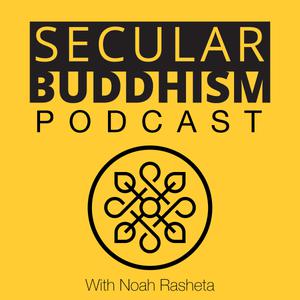 Secular Buddhism
Secular Buddhism
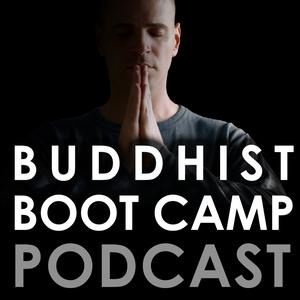 Buddhist Boot Camp Podcast
Buddhist Boot Camp Podcast
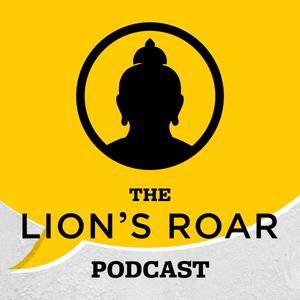 The Lion’s Roar Podcast
The Lion’s Roar Podcast
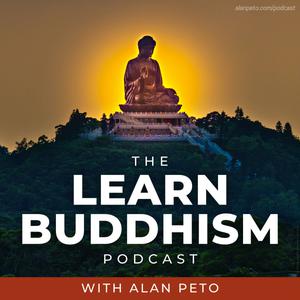 Learn Buddhism with Alan Peto
Learn Buddhism with Alan Peto
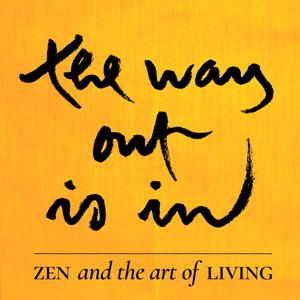 The Way Out Is In
The Way Out Is In
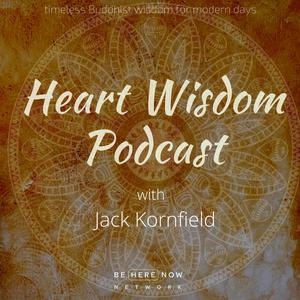 Heart Wisdom with Jack Kornfield
Heart Wisdom with Jack Kornfield